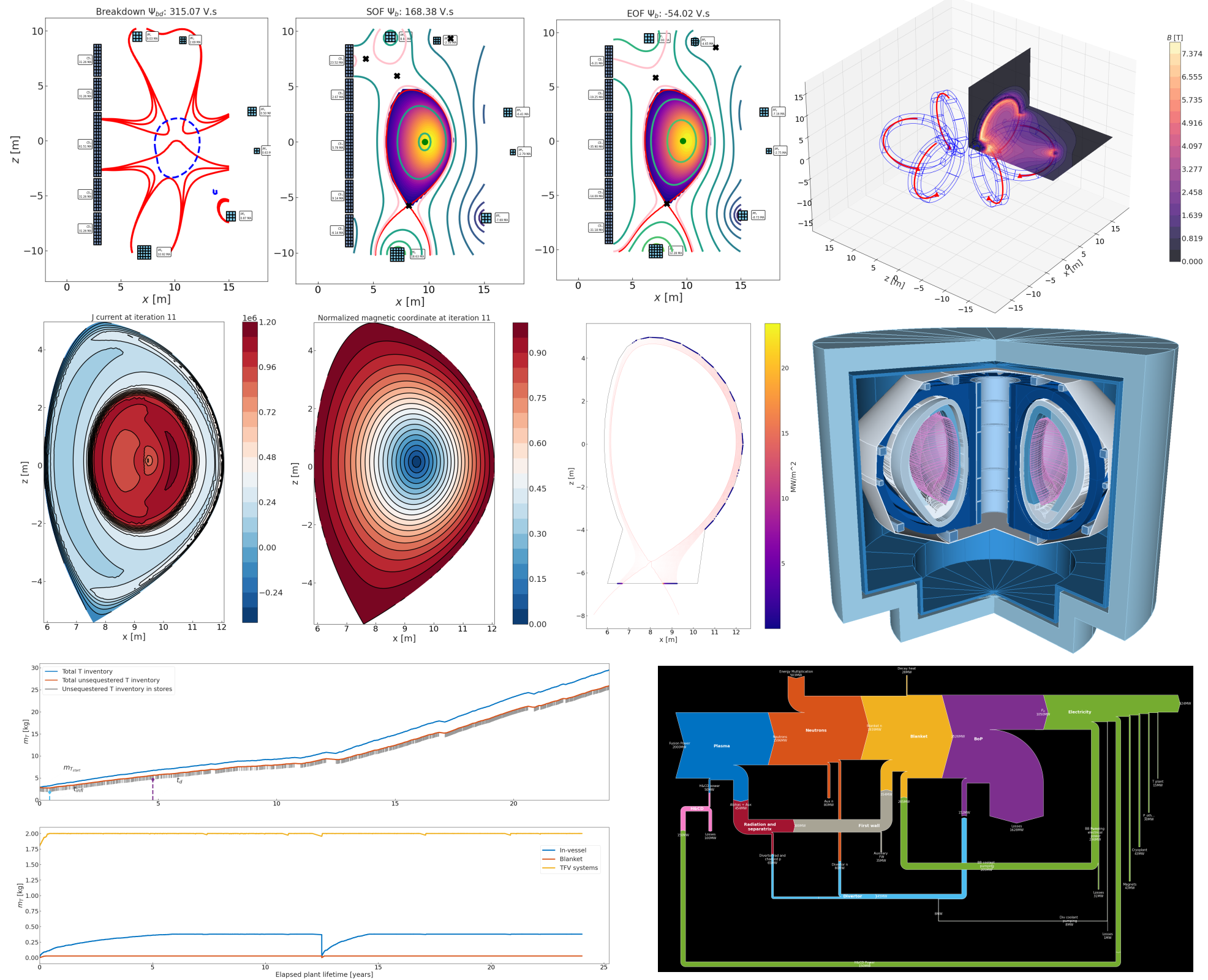Bluemira is an integrated inter-disciplinary design tool for future fusion reactors. It
incorporates several modules, some of which rely on other codes, to carry out a range of
typical conceptual fusion reactor design activities.
Bluemira was created from two similar codes: BLUEPRINT and MIRA (see
publications).
The bluemira team has been working hard since mid-2021 to combine BLUEPRINT and MIRA into a single reactor design framework. We took the opportunity to embark upon
a significant refactor of both code bases, delivering improved functionality, code
quality, and hopefully maintainability. This, along with some resourcing issues has
caused our feature roadmap to slip. A lot of functionality that was present in BLUEPRINT and MIRA is not yet available in bluemira.
Bluemira is very much under active development, and will likely be subject to API
changes in the near future. We apologise in advance for these. Please do get in touch
before starting to use any modules, so we can warn you of changes to come.
Below is an overview of our development roadmap for 2024/25:
Bluemira is composed of various modules:
balance_of_plant: power balance solver and toolsbase: the software backbone of thebluemiraframeworkcodes: interfaces to external codes (both API and file PI)display: plotting and display moduleequilibria: equilibrium solvers and objectsfuel_cycle: fuel cycle modelgeometry: the geometry "engine" of thebluemiraframeworkmagnetostatics: magnetostatics solversmaterials: materials moduleoptimisation: interface to optimisers and associated toolsplasma_physics: 0-D plasma physics toolsradiation_transport[WIP]: radiation and advection transport solversstructural: beam finite element structural solverutilities: collection of utility toolboxes for file IO, databases, machine learning, and misc.
The bluemira code and its modules are described in the following publications:
- TBD
As bluemira is the result of an integration between two historical codes,
some previous publications may also be of interest.
The BLUEPRINT code and its modules are described in the following publications:
- BLUEPRINT: A novel approach to fusion reactor design, Coleman and McIntosh, Fusion Engineering and Design v 139 pp 26-38 (2019)
- DEMO tritium fuel cycle: performance, parameter explorations, and design space constraints, Coleman, Hörstensmeyer and Cismondi, Fusion Engineering and Design v 141 pp79-90 (2019)
- The design and optimisation of tokamak poloidal field systems in the BLUEPRINT framework, Coleman and McIntosh, Fusion Engineering and Design v 154 111544 (2020)
- High-speed generation of neutronics-ready CAD models for DEMO design, Coleman, Shimwell, Davis, and McIntosh, Fusion Engineering and Design v 160 112043 (2020)
The MIRA code and its modules are described in the following publications:
- On the implementation of new technology modules for fusion reactor systems codes, Franza, Boccaccinni, Fischer, Gade, and Heller, Fusion Engineering and Design, v 98-99 pp 1767-1770 (2015)
- Development of an advanced magnetic equilibrium model for fusion reactor system codes, Franza, Landman, and Petschanyi, Fusion Engineering and Design, v 136 pp 309-313 (2018)
- Development and Validation of a Computational Tool for Fusion Reactors' System Analysis, Franza, Ph.D thesis, Karlsruher Institut für Technologie (2019)
- MIRA: a multi-physics approach to designing a fusion power plant, Franza, Boccaccini, Fable, Landman, Maione, Petschanyi, Stieglitz and Zohm, Nuclear Fusion, v 62 076042 (2022)
Bluemira is released under the LGPLv2.1 license, but we also ask that
you show professional courtesy when using this code:
-
Since you are benefiting from work on
bluemira, we ask that you submit any improvements you make to the code to us by submitting a pull request to this repository. If you are looking to develop aspects of this code or add parts to it, please contact us beforehand so that we can help/advise if necessary. -
If you use
bluemiraresults in a paper or professional publication, we ask that you discuss your work and results with one of thebluemiraauthors first so that we can check them. It is not necessary to listbluemiradevelopers as co-authors. If one or more of thebluemirateam are involved in preparing results or new functionality used in your work, then those members should be offered a co-authorship. -
If you use
bluemiraor any of its modules in your work, please help ensure that all the authors get the credit they deserve by citing the relevantbluemira,BLUEPRINT, andMIRApapers.
For a full list of existing publications, see here.
See code of conduct.
See our installation guide.
For working on bluemira you will also need to install the development dependencies
and the git pre-commit hook:
python -m pip install --no-cache-dir -e .'[dev]'
pre-commit install -fPlease see the guidelines for contributing to bluemira.
Tests are run with pytest. To run the main tests:
pytestTo run all the tests:
pytest --reactor --longrun --plotting-onpytest also supports running individual test files and selecting tests by name or
using a regular expression. See the
pytest documentation.
After a test run an html report of the results can be found in report.html. A test
coverage report can be found in the htmlcov directory.
Further information about our testing can be found here.
The documentation is built with Sphinx. In addition the API documentation is created by
sphinx-apidoc.
To build the html documentation execute this command:
sphinx-build documentation/source documentation/buildNew pages can be added by adding them to the documentation/source directory and adding
a link in the toctree section of index.rst. The index page lives at
documentation/build/index.html. API documentation will be automatically generated from
the bluemira source code.
